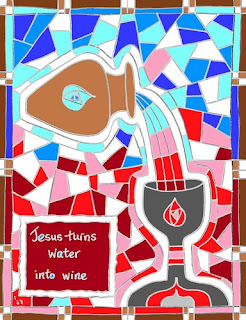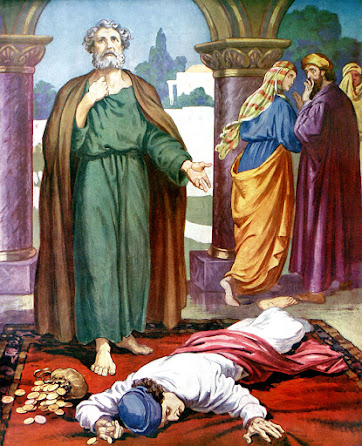John 2:1-11
Epiphany 2 / Year C
One of
my colleagues made an admission on our zoom call with the bishop this past week. She exhaled a sigh and said, “I have lost my
mojo.” She was discouraged, flat,
spent. Using the vernacular of today’s
reading from the gospel, we might say the wine had run out of her life. We all have been there and given this enduring
pandemic it is becoming more and more frequent for each of us.
For her
part, the bishop was (as always) very pastoral and comforting. Then she posed a question to us, “What do you
do when you run out of mojo?” Never one to
keep my thoughts to myself, I chimed right in and described how down I was
after Christmas. Two things seemed to
help me, I said. One was talking about it
in a sermon, which I did two weeks ago.
The simple act of giving a name to where you are is the beginning of
getting some kind of a handle on it. Think
about Mary’s role in naming today’s challenge at Cana, “They have no wine!” If she had not named it, Jesus would not have
known to act.
The
second thing that helped me was being able to celebrate communion again on Sunday
morning because we had a week to distribute communion-to-go bags. There is something very powerful “always and
everywhere” to give thanks to God – even in (and especially during) these
unprecedented times. The wine may run
out for a season, but it will be brief and in time discouragement will give way
to celebration.
I started
to read a book in preparation for what we might focus on for a Lenten
program. It is called The Gratitude
Project. It is a collection of writings
and essays put out by a research group at U.C. Berkley. This group has spent twenty years exploring “the
roots of happy and compassionate individuals, strong social bonds, and altruistic
behavior.” What they call “the science
of a meaningful life.” And they have
learned firsthand how gratitude has the power to transform lives, families,
neighborhoods, schools, workplaces, and even nations.
I’m only
a tenth of the way into the book, so I have a lot to learn. Already I have awakened to some things right
in front of each of us; so close as to become invisible. For example, the researchers define appreciation
as “the act of acknowledging the goodness of life.” It is not the denial of bad things and real
challenges. Rather, it is the awareness
there are positive things in our life.
Gratitude, they say, goes one step further by recognizing “how positive
things in our lives… are often due to forces outside ourselves, particularly
the efforts of other people.” Grateful
people have a certain level of humility because they understand they could not
be who they are without the contributions of others.
Hopefully
you are becoming more aware of this every time you go to the grocery store, as
an example. I am more aware of the people
who are working there – cashiers on eight-hour shifts and stockers who are not
simply clogging up the aisles, but stocking the goods I am there to purchase. The empty shelves serve as a reminder this
work does not just happen by itself. I
am more aware of the truckers and warehouse workers who are struggling to fill
inventories. Then there are the manufactures
and farmers and so many, many other people who make it possible for me to buy a
loaf of bread and a dozen eggs. When you
stop to think about it, it really is remarkable you can drive a few minutes
from your home and purchase pretty much everything you need for any meal you
want. As the collect says, “help us not
to forget that our common life depends on each other’s labor.”
The
Gratitude Project states there are four components to
gratitude:
·
What we notice for which we are grateful. It is easier to be grateful for the
extraordinary, but more difficult to be cognizant
of the ordinary blessings of everyday life.
·
How we think about why we have been given
these good things. Was it a spontaneous
act or did it come with strings attached?
·
How we feel about the things we have been
given. At Christmas we see commercials
of a husband leading his wife out to the driveway where a brand new Lexus is
parked, complete with massive red bow on top.
That has never happened to me.
Instead, I open a package from Grandma and discover she has knit me a
pair of mittens. How do you feel about
the things you have been given? Can you
appreciate every act of generosity?
·
What we do to express our
appreciation. If Grandma is present, I may
say “Thank you. They look like they will
be so warm.” Or I may give her a hug. If she is not there, I may call her on the
phone or write her a note (Well, given I was raised in the north, you know I didn’t
write a note!).
Does gratitude
matter? Does it make a difference in a
person’s life? One study asked a group
of people to identify six goals they wanted to work on over a ten-week period. Half of the group was also instructed to keep
a Gratitude Journal in which once a week they recorded five things for which
they were grateful. Those keeping a
journal made 20 percent more progress on their goals than those who did
not.
In another
experiment, two four-year olds are in room playing and one child is given two
treats. Some choose to keep both while
others opt to share. When the children not
given the two treats are put in a new environment with a different child and
then give two treats, those who experienced sharing are significantly more
likely to share than those who did. Gratitude
fosters generosity and selflessness.
As I am
reading the book I am acutely aware it is written from a secular perspective. It does not talk about faith communities and
religious beliefs, which is OK because I can fill in the blanks. It occurs to me if you want to get your body
in shape you will join a fitness club. And
if you want to do something positive for your community you will find different
ways to volunteer your time. And if you
want to grow your sense of gratitude you will go to church.
Think
about it, gratitude is at the very heart of who we are and what we are all
about. We are grateful to God for life
and love and the goodness made known to us in creation. And we are grateful for one another – the choir
anthem, the cup of coffee, the flowers on the altar, the listening ear, the
word of prayer, the attention to building and grounds… I could go on and on. There is a reason the second half of our
service is called “The Great Thanksgiving.”
But let
me close by telling you this. My phone
rang just as I sat down to begin writing this sermon. It was my colleague who had lost her mojo. She wanted to tell me how much she
appreciated me and my willingness to say I too have been discouraged. Like me, she found naming it was the beginning
of moving beyond it. After the zoom she
went for a walk – an activity which always opens her to the good things in life
– and this too moved her forward. She
could not thank me enough for what I shared.
“Well,” I said to her, “Let me tell you about the sermon I am about to
write…”
Mojo
returns. Discouragement has its day and
then must yield to gratitude. Water does
turn into wine! Amazing!



No comments:
Post a Comment